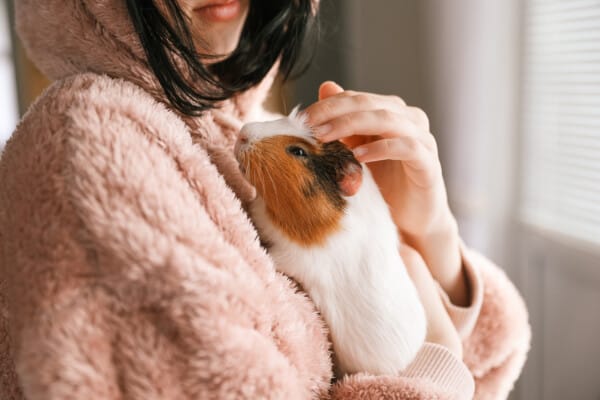When getting a new pet, one of the most important things to consider is whether his new environment will be suitable for him. With the trend of moving from the countryside to the city, many pet owners may ask themselves “Will my ferret thrive in a smaller flat or apartment?”
The good news is, ferrets can live in an apartment. They do not need a lot of space to thrive and a well-arranged flat is perfect for them. With proper training and a few tips to ferret-proof your apartment, they will be a great companion to keep in your flat.
The Pros Of Keeping A Ferret in an Apartment
Your ferret is less likely to escape
It’s a lot easier to contain a ferret in an apartment that very likely only has one or two portals to the outside world, and even then you most likely open your door onto a corridor that will act as another line of defense between your ferret and his next adventure.
A house, on the other hand, probably has multiple doors and plenty of windows that a ferret wouldn’t hesitate to slip through to try to discover the neighborhood. For this reason, many ferret owners choose to ferret-proof their house, or at least the room where their critter will stay during playtime.
Better supervision
An apartment is a small enough place you can easily keep an eye on your furry pal and them an eye on you. You will be able to put a stop to any mischief quickly and easily if you are always sure where he is.
On the flip side, if he can always see and hear you he’ll probably be much happier for it. Just because ferrets are fine to be alone doesn’t mean they don’t love to be around you as much as you love to be around them.
The Disadvantages Of Having A Ferret In An Apartment
Unfortunately, there are also a bunch of cons to having a ferret live in your apartment with you.
What the law says
You may not even be allowed a ferret in your apartment, so it’s probably best to check your lease, and if you are still not sure, ask your landlord.
Many rental properties will happily allow your fuzzy friend to live with you, but a good deal won’t. A lot of landlords have specific rules about what pets they do and don’t allow for multiple reasons, which leads me to my next point.
Ferrets can smell
You need to keep in mind that ferrets have a musty body odor and will naturally transfer that smell to everything they touch. Because of this, they need to be kept clean or the apartment will start to develop a rodent smell that may violate your lease.
You can’t always leave a window open to air out your apartment when there’s a ferret lurking nearby who would want nothing more than to jump right out. It’s not always safe to leave the window open if you have a ferret, even if you will be supervising at all times.
How much space does a Ferret need?
If you are purchasing a ferret, you are aware they are not exactly the largest creature, though they still need plenty of room to romp about. However, ferrets are content to be locked up in a cage while you are at work without causing damage to themselves or their surroundings.
As a matter of fact, ferrets can sleep between 14 and 18 hours per day, an activity they will happily enjoy inside their cage. The rest of the time will be dedicated to eating and playing with you or other ferrets.
Their playstyle is similar to that of a small cat or kitten, chasing after moving objects and each other. This does need some space, but it is well within the space that even a small flat cannot provide.
Can I leave a ferret alone in my apartment?
Yes, you can. Unlike dogs, who can become distressed and neurotic when left alone for prolonged periods of time, ferrets are content to be by themselves. They don’t always need other animals or human interaction to be happy.
That’s not to say they don’t enjoy socializing and playing games with you. It just means you don’t have to worry about coming back to a trashed apartment. It’s still advised to keep your ferret in a cage when you’re away from them, though.
Tips and tricks for keeping a ferret in a flat
Rules permitting, it’s fine to have a ferret in your apartment. Here are some tips for keeping your ferret happy and entertained in your flat.
1. Ferrets need litter boxes, just like cats
Unlike cats, who instinctively learn to use a litter box, you’ll need to teach your ferret how. Don’t leave him time to develop bad habits like going on the floor in places you won’t notice before it’s too late.
The best way to teach a ferret to use a litter box is similar to how you would teach a puppy to go outside. When they start showing signs they want to go to the bathroom – or if they have just done so – pick them up, and their feces, and put them in the litter box together.
2. Make sure you get him a decent-sized cage
When you are not around to keep an eye on your ferret, it’s much safer and easier to keep him in a nice-sized enclosure – around 24″ x 24″ x 18″ is enough so he won’t feel cramped and not so big he will fall and hurt himself climbing around.
Even when you are in the apartment you may want to make use of the cage, perhaps you have guests over and you’d rather not have your ferret climbing all over your date.
Maybe you need to clean the apartment and give it a nice air out by opening all the windows without your ferret making his great escape.
3. Get your ferret entertained
Because your ferret won’t be spending all day and night hunting and foraging he is free to rest much more than he otherwise would. When he’s not sleeping, he’ll be doing the other thing ferrets love to do: play.
When selecting toys for a ferret, those with small pieces should be avoided 100%. As should plastics and foams that he could swallow and cause severe medical complications.
Because they have such a tendency to chew and swallow what they can, you will need to ferret-proof your apartment and remove any choking hazards. It’s not as simple as babyproofing an apartment, ferrets can climb on top of every surface, but babies can’t.
4. Give your ferret a balanced diet
Just because ferrets are small and cheap to buy doesn’t mean they’ll be cheap to care for. They require a very balanced diet from a young age. It’s best to get them used to a varied diet as soon as possible, to get them into the routine.
Even though their diet is varied it should still be meat-based at all times, ferrets are obligate carnivores and should not be fed fruits and vegetables. They of course also need access to clean fresh water several times a day. Remember, even as a treat, ferrets should not be given sweet sugary things!
5. Spend time playing with your ferret
Ferrets love to play, they are full of energy and have great fun expending it by racing around. You can play so many games to keep your ferret healthy and stimulated.
Ferrets really enjoy playing tag, it lets them stretch their legs as you chase each other around the apartment. Even the smallest apartments will provide enough room for you to have a good run about together.
If you’re not feeling particularly energetic yourself you could buy a little remote control toy that’s appropriate for an apartment. Your ferret will happily chase around a remote control car or something similar until the batteries die.
Alternatively, you could make a maze for your ferret, mental stimulation is as important as physical. Ferrets are great problem solvers so making a maze will challenge you both.
6. Good ferret medical care
Ferrets – like most pets – should be vaccinated regularly. Every 12 months your furry friend needs a visit to the vet to get some booster shots. If you’re unsure whether or not something is wrong with your ferret, don’t panic. Just give the vet a call.
The biggest thing to look out for is if your ferret is eating and drinking properly. If he stops eating and drinking that could be an indicator that there is a major issue, such as ulcers, and you should seek medical attention.
Alternatively, if he is eating and drinking plenty but keeps getting sick you should obviously get him checked out.













